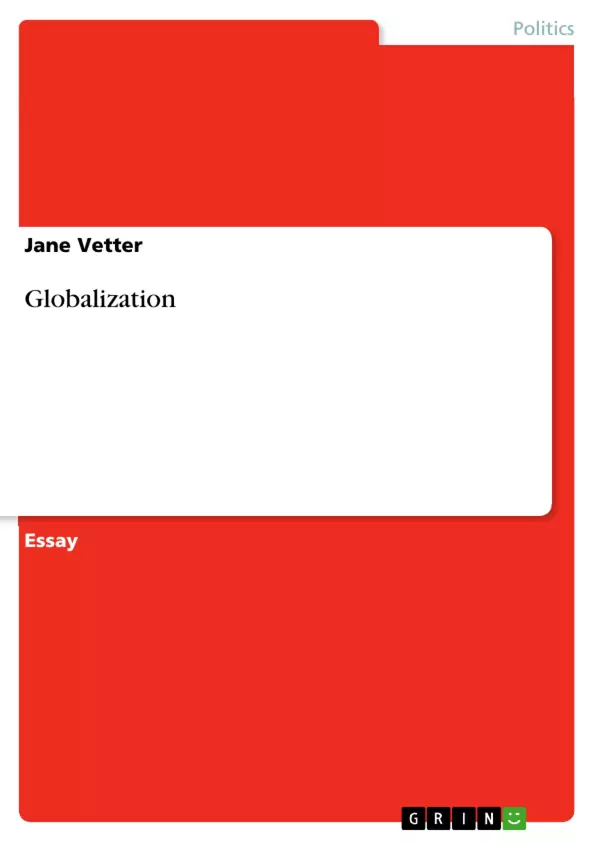According to the online dictionary Merriam-Webster Online, globalization is “the
development of an increasingly integrated global economy marked especially by free trade, free
flow of capital, and the tapping of cheaper foreign labor markets.” Globalization, however,
reaches beyond the economic scope since it “is a term that encompasses all cross-border
interactions, whether economic, political, or cultural.” (Marber 56). Within a globalized world,
everything is related and connected, constantly changing and transforming not only the economy
but also politics, culture, consumption, and telecommunications. The following paper aims at
showing how the world is becoming globalized, what advantages and disadvantages appear
throughout this process, and why globalization is an overall good thing for the world and its
citizens.
As already mentioned, globalization affects several levels of interaction. With regard to
the economy, free trade and less trade barriers enabled the forces of globalization to grow
stronger and faster than ever before in human history. Within the last twenty years, the Soviet
Union and China have integrated economically with the West while Latin America and Asia have
worked toward stable and liberal systems in order to be part of “meaningful socioeconomic
progress and […] Western standards of living.” (Marber 56).
Inhaltsverzeichnis (Table of Contents)
- Globalization
- Economic Implications
- Political Implications
- Cultural and Technological Implications
- Disadvantages of Globalization
- Globalization: A Positive Phenomenon
Zielsetzung und Themenschwerpunkte (Objectives and Key Themes)
This essay aims to explore the multifaceted nature of globalization, examining its economic, political, and cultural implications. It analyzes the advantages and disadvantages of this global phenomenon, arguing that despite its drawbacks, globalization is ultimately a positive force for the world. Key themes explored in this essay include:- The economic impact of globalization, particularly free trade and the growth of transnational corporations.
- The role of globalization in promoting political stability and democracy.
- The cultural exchange and homogenization brought about by globalization.
- The challenges posed by globalization, including inequality, Westernization, and environmental degradation.
- The ultimate argument that the positive effects of globalization outweigh its negative aspects.
Zusammenfassung der Kapitel (Chapter Summaries)
- **Globalization:** The essay begins by defining globalization and highlighting its diverse impacts on economic, political, and cultural spheres. It explores the rise of free trade, the growth of transnational corporations, and the increasing interconnectedness of nations.
- **Economic Implications:** This section delves into the economic consequences of globalization, showcasing the benefits of free trade, the expansion of capital and knowledge flows, and the rise of international finance. It also discusses the role of foreign direct investments in promoting economic growth and reducing poverty.
- **Political Implications:** This section examines the political ramifications of globalization, emphasizing the need for stable institutions, human rights, and effective governance to facilitate free trade. It argues that democracies are better equipped to meet these requirements due to their outward-oriented, liberal approach to the free market.
- **Cultural and Technological Implications:** This section explores the cultural and technological aspects of globalization, highlighting the increased interconnectedness of the world through communication technologies, the spread of Western cultural influences, and the merging of traditions with modern trends.
- **Disadvantages of Globalization:** The essay acknowledges the downsides of globalization, including issues of inequality, Westernization, and environmental degradation. It explores how globalization can lead to a loss of cultural diversity and traditions, while also raising concerns about security threats, outsourcing, and the environmental consequences of increased consumption.
Schlüsselwörter (Keywords)
The essay focuses on the multifaceted phenomenon of globalization, exploring its economic, political, and cultural impacts. Key terms and concepts include: free trade, transnational corporations, globalization's impact on politics and democracy, cultural exchange, homogenization, inequality, Westernization, environmental degradation, and ultimately the argument for globalization's positive effects.Frequently Asked Questions
What is the comprehensive definition of globalization?
Globalization encompasses all cross-border interactions, including economic, political, and cultural exchanges, leading to an increasingly integrated world.
What are the economic benefits of globalization?
It promotes free trade, reduces trade barriers, increases foreign direct investments, and allows for the flow of capital and knowledge across borders.
How does globalization affect politics and democracy?
Globalization often encourages stable governance, human rights, and liberal market systems, as these are necessary for participating in the global economy.
What are the main disadvantages of globalization?
Key concerns include environmental degradation, economic inequality, loss of cultural traditions, and the risks of outsourcing.
Is globalization ultimately a positive phenomenon?
The essay argues that despite its drawbacks, the overall progress in living standards and global interconnectedness makes it a positive force for humanity.
- Quote paper
- Jane Vetter (Author), 2006, Globalization, Munich, GRIN Verlag, https://www.grin.com/document/116461



